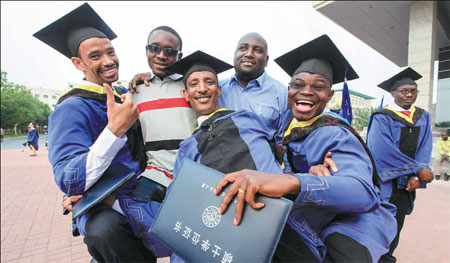Universities seek greater enrollment from abroad
Updated: 2013-08-26 07:25
By Yang Yang (China Daily)
|
||||||||
|
African students celebrate their graduation at Tianjin University of Technology and Education. More than 130 African students have graduated from the university since 2006. Li Xiang / Xinhua |
|
A Pakistani student, whose Chinese name is Mu Yang, studies traditional Chinese medicine at a clinic in Nantong, Jiangsu province. The 25-year-old graduated from Nantong University earlier in the summer. Huang Zhe / Xinhua |
|
Kibirango Edwin (left), a student from Uganda, practices Chinese calligraphy with classmates in his dormitory at Jiangsu University in Zhenjiang. Yang Yu / for China Daily |
Language barriers, career prospects and teaching facilities dent enthusiasm of international students considering studying in China, Yang Yang reports
Samuel Goldstein is spending his gap year in China. While the Washington University political science student still has a year to go before graduation, he has decided to apply for a master's degree course in Chinese.
But there is a twist in his plan. Instead of applying to a Chinese university, the 20-year-old wants to attend a satellite school of a US university in China, which he believes will guarantee the quality of education.
"Chinese education is not comparable with Western education. I am half-Swiss, so it's easy for me to go to Switzerland or any other European country to study, but economic growth is lower there and so there aren't as many opportunities in Europe as in China," he said.
"I am fascinated by Chinese culture and language and the economy offers a lot of opportunities."
China's culture and economy may attract overseas students, but the education system does not. And that's a big problem, because the government is trying to attract more foreign students as part of an internationalization strategy in an attempt to grab a slice of the international education market.
In 2011, there were approximately 4.3 million internationally mobile students in tertiary education worldwide, with 77,400 studying at colleges in China, according to statistics from the Organization for Economic Cooperation and Development.
The Chinese Ministry of Education reported a higher number, saying that the country played host to 119,000 overseas students in 2011, including 88,500 college and undergraduate students, 23,600 graduate students, and 6,900 postgraduates.
According to the ministry's action plan, China will host 500,000 international students at all levels by 2020, becoming the top Asian destination for overseas students. The number of overseas college and university students is expected to reach 150,000.
However, Darryl S.L. Jarvis, associate dean of research and postgraduate studies, and professor of global studies at the Hong Kong Institute of Education, doubts that China can be truly competitive in the international education market, even though the country, "is trying to achieve the goal via the development of English language programs and increasing the number of scholarships for overseas students to 50,000 by 2015".
Language barrier
The biggest barrier is linguistic, according to Jarvis. "While Mandarin will, of course, be an important language going forward, the main language for international commerce as well as the adopted language for scholarly engagement in the hard sciences and social sciences will remain English," he said.
Sang Peng, president of the Beijing Overseas-Study Service Association, said, "To my knowledge, about 60 percent of the foreign students come to China to study the language, which is not a common phenomenon compared with other countries, especially the top destinations like the US and the UK."
Jarvis cited other factors influencing student numbers, including academic reputation, university facilities and career opportunities. Moreover, overseas graduates of Chinese universities can expect a lower starting salary than their counterparts with a degree from a US institute, for example.
The holder of an MBA from Harvard can expect to find a job quickly. The annual starting salary is around $120,000 and the promotion prospects are good. They can also expect to work for a major multinational business and experience lots of international travel.
"By contrast, students with a business degree from a well-regarded Chinese university can expect a starting salary of only about one-third to a half of that figure. They will be employed by a Chinese enterprise and will not necessarily be internationally mobile.
Similar differentials can be identified for petroleum engineering graduates. Petroleum engineers graduating from a Chinese university can expect only one-third of the $90,000 annual starting salary expected by engineers from a quality school in the US.
"Graduates from Chinese universities currently do not enjoy these sorts of career options or command the types of salaries that graduates from Western universities enjoy," said Jarvis.
Quality of tuition
Goldstein decided not to apply to a Chinese university because of concerns about the quality of education.
"I know people who got their master's degree in Chinese like any other Chinese student. They take the master's degree courses, but they don't learn anything. Everything they learn comes from their own research and reading," he said.
"Maybe you can just buy a degree, one of those diplomas from famous Chinese universities with your name printed on them. If you take the degree to someone, they might think it is a fake, even if you indeed graduated for real. I know a student who can't speak Chinese, but got an A for Chinese class.
Apart from the academic environment, many foreign students are uncomfortable with the culture at Chinese universities.
One female student, who asked not to be named, arrived in China in 2010 after graduating from Cambridge University in the UK, where she spent four years studying Chinese. In July, she left Peking University with a master's degree in international relations. After two years' study in China, she said the education system has a number of problems.
"Part of the reason I decided to do a masters in China was to improve my Mandarin. I think that for international students who want to improve their language skills, studying a subject in the language you are learning really helps you to improve quickly," she said.
Despite her background in Chinese studies, she encountered many challenges. Perhaps the most striking difference between Eastern and Western universities is the student -teacher relationship.
"In the West, it's quite normal and expected that students at university level disagree with some of their teachers' opinions and debate with them in class. In China, a lot of students seem to think the teachers are always right and will never disagree with them, especially in front of the whole class," she said.
"I think this seems very strange to a lot of international students. It sometimes means that there is not much debate in class, or even that the teacher ends up speaking for the entire duration of the class with very little interaction with the students.
Another thing she found difficult was how to behave around teachers in China, especially the supervisors.
"Many Chinese students seemed to give their teachers a lot of presents. That's quite different from the UK; we might give a teacher a small present at the end of the year after they have given us our marks, but not before, because it would seem very suspect. Sometimes I found it hard to know the right thing to do in those situations," she said.
"The student-teacher relationship in China is unequal. Sometimes I felt the teachers thought of the students (even those on master's courses) as young children, who didn't really have anything important to do. It seems far more common for teachers to ask favors of their students than in the West."
As an example, she mentioned her surprise when she heard a teacher ask a student to clean his office.
Campus red tape
Another challenge for international students is the bureaucracy inherent in the system.
"It is far more complicated than it would be in the UK and often seems to involve going to five different offices to get papers stamped and then another one to pay. I think that's very confusing and frustrating for many international students. For instance, in the UK, once you have completed your exams and got your results, you graduate automatically and do not need to do anything more. In China, we had a whole list of 'leaving school procedures' that had to be completed both online and in person, which just seemed so complicated and unnecessary to international students," said the female student.
Yang Rui, professor of education at Hong Kong University, said: "The general situation is that formal education globally has largely become Western education. But most Chinese educators still lack a thorough understanding of Western ideas and approaches. Because of that, they are often unable to satisfactorily incorporate the Chinese content into their curriculum and teaching practice."
For Sang Peng, the problem lies in the government's regulations on international students.
"I think the government should pay more attention to education rather than regulations," he said.
In the 1950s, China started to receive international students, but the process was interrupted by the "cultural revolution" (1966-76) and only on July 1, did it become legal for foreign students to take a part-time job in China.
"Although more detailed regulations are needed and many problems will remain, the government has taken a big step toward following international trends."
Globally, countries are paying great attention to attracting foreign students because internationally mobile students bring financial and cultural benefits to their host countries.
In addition, non-educational issues such as pollution, food security and heavy traffic are keeping potential professorial recruits away if they have an option elsewhere. These issues could equally be keeping international students away.
"Back in the US, people talked a lot about the pollution here. I probably won't study for my master's degree in Beijing because of the poor air quality. Maybe I will go somewhere like Nanjing instead," he said.
Future tense
Yang said China's desire and need to attract more international students is in line with the country's rising global profile.
"It is in China's interests to host more students from overseas. They will help their own societies understand China better and interact with China more effectively across a range of social areas," he said.
"It's also in the interests of those who interact with China. International students have always been the best way of building intercultural relations and improving a country's influence. China is no exception and this has been proved by its own history and by contemporary practice among major world powers."
There is still a lot for the government to do; most important is educational reform that would benefit both domestic and foreign students, plus reform of the salaries of university teachers and the regulations on international students.
For Rahul Choudaha, director of research & strategic development at World Education Services, a nonprofit organization that specializes in international education and research, greater knowledge of the outside world is key: "China has untapped potential, but to realize grandiose goals, a deeper understanding of international students is required - shooting in the dark is a sure way to miss the goal."
Contact the author at yangyangs@chinadaily.com.cn
(China Daily USA 08/26/2013 page7)
Most Viewed
Editor's Picks

|

|

|

|

|

|
Today's Top News
Trending news across China
Newly born panda cub at Washington zoo doing fine
Market regulators need to fix loopholes
Singapore PM aims to cement relations
Experts call for details on rumor cases
Joint sea drill shows improved relations
Bo insists he did not abuse power
UN to probe alleged chemical attack
US Weekly

|

|


















